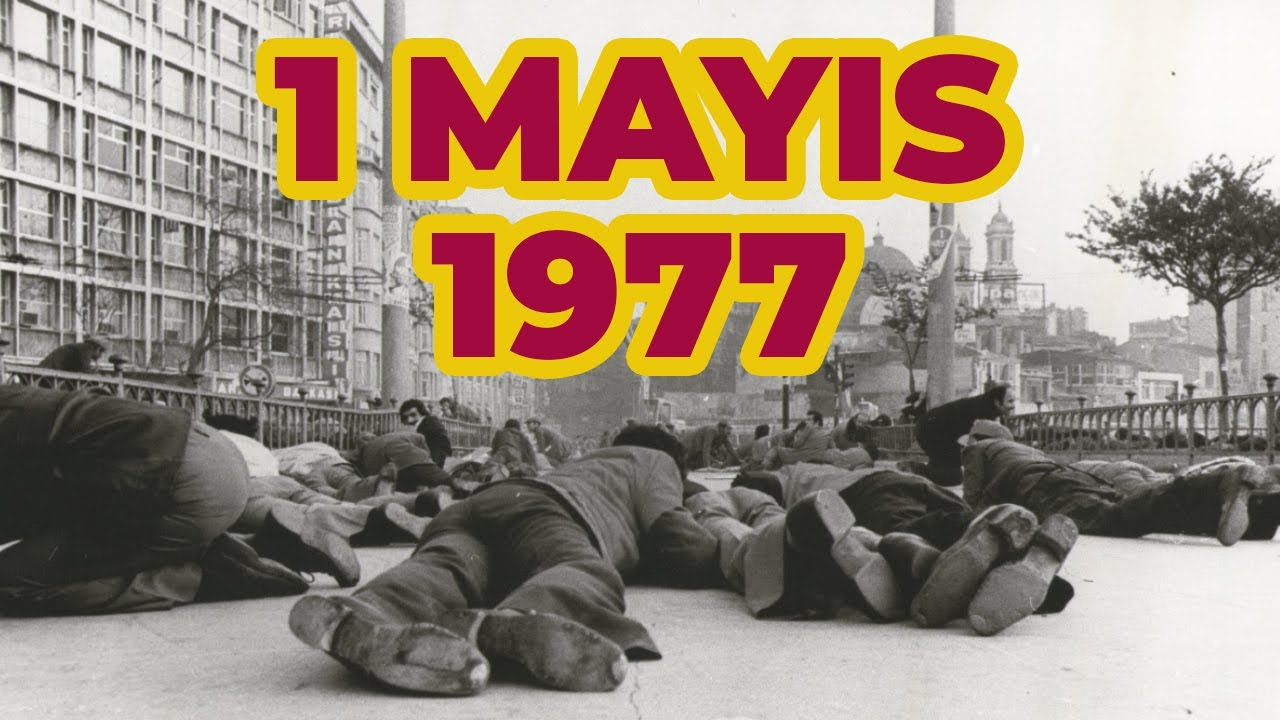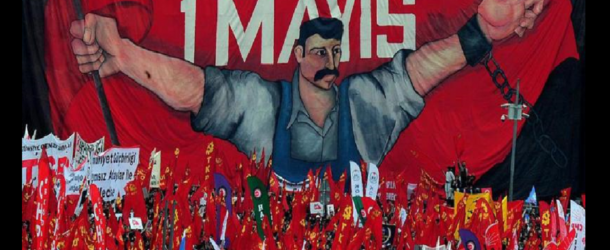May Day, Labor Day, or International Workers’ Day is an official celebration and holiday for laborers and worker classes around the world. International Workers’ Day represents the political and socioeconomic gains that the worker classes and the labor movement made throughout history, for sure after long struggles and suffering.[1] After the Haymarket Riot in Chicago in 1886, starting from 1889, Labor Day was designated as an official celebration in the United States (U.S.) and many Western countries upon the demands made by Second International. In time, with the development of labor law and social rights including workers and white-collar employees, the day has begun to be celebrated in all modern countries. While Labor Day was traditionally celebrated on the first Monday of September in the U.S. and Canada in the earlier decades, in Europe and the rest of the world “May 1” became the date of the celebration. In 1955, the Catholic Church also declared May 1 as the “Saint Joseph the Worker Day” to support workers’ rights. 1 May was celebrated in almost all regimes including the totalitarian Nazi Germany and the communist USSR as well.
Similar to Western countries, Türkiye also -under the leadership of its charismatic founder and war hero Mustafa Kemal Atatürk- officially designated May 1 as an official celebration and holiday a few months before the proclamation of the Republic. Atatürk named 1 May as the “Workers Day” (İşçi Bayramı). Accordingly, the first official celebration in Türkiye was made on May 1, 1923, a few months before the new regime was declared on October 29, 1923.[2] However, in 1924, the new regime banned mass celebrations with the fear of anti-government and/or anti-regime protests. In 1925, after the Sheikh Said Rebellion which created serious problems in the south-eastern villages in the country between February and April of that year, the government banned 1 May celebrations for a decade with the Law for the Maintenance of Public Order (Takrir-i Sükun Kanunu). However, a decade later, despite serious limitations on worker movements due to the fears of the spread of communism and Soviet infiltration[3], May 1 began to be celebrated regularly in Türkiye after 1935.[4]

Bloody 1 May 1977
Starting from the 1960s, with a more liberal constitution (1961 constitution) and noticeable rise of unionist and socialist movements especially among the university youth, May 1 celebrations had become the trademark of the left-wing politics in Türkiye and were impropriated mainly by the trade unions, the center-left CHP (Republican People’s Party) and other moderate and far-left political parties, groups, and people. During this period, in Istanbul, Taksim Square was the main celebration destination for 1 May celebrations due to its historic importance in Turkish modernization as well as its central place in Istanbul. However, during the tense days of the Cold War, in 1977, the 1 May celebration in Taksim Square turned into a disaster. Known as the “Bloody May 1” (Kanlı 1 Mayıs) or “Taksim Square Massacre” (Taksim Meydanı Katliamı), due to the fire on demonstrator groups that lasted around 10 minutes, 37 civilians died and many injured.[5] Although none of the perpetrators were caught by the Turkish State and held accountable for this bloodshed, eyewitnesses testified that armed men on the building of the Directorate of Waters (Sular İdaresi) and Intercontinental Hotel as well as some policemen in a white Renault car committed this crime.[6] Many Turkish journalists and academics later analyzed this event as part of NATO’s Gladio organization’s (also called the “counter-guerrilla” (kontrgerilla) by former Prime Minister Bülent Ecevit[7]) strategy based on provocations to create military coup conditions in Türkiye and to stop the rise of left-wing politics in the country.[8] In 1978, despite fears of a terrorist attack, 1 May was celebrated with a very large crowd in Taksim Square once again. However, starting in 1979, the state did not allow Labor Day celebrations due to security risks.
After the military coup in 1980, 1 May celebrations were completely banned by the military regime, and left-wing politics were swept away by the state’s very harsh policies. As Türkiye became a more open and democratic country in the 2000s due to EU harmonization laws and a more civilian-minded government, starting in 2007, the Turkish workers syndicate DİSK (Confederation of Revolutionary Trade Unions of Turkey) began to push for reform and some groups illegally entered into Taksim Square to commemorate the May Day in 2007 and 2008. In 2009, the AK Parti government and then-Prime Minister Recep Tayyip Erdoğan made a historic decision and allowed 1 May to be celebrated as Labor and Solidarity Day (Emek ve Dayanışma Günü) in Türkiye again similar to all civilized regimes in the world.[9] A large crowd illegally entered Taksim Square that year and Labor Day was celebrated peacefully. In 2010, 2011, and 2012, the Erdoğan government allowed official celebrations at Taksim Square and no problems or instances took place during these three years’ celebrations.[10]
But starting in 2013, the Erdoğan government’s approach to worker movements was changed and Labor Day celebrations at Taksim Square were banned. In 2013, starting in late May, a large wave of protests known as “Gezi Park Protests” (Gezi Parkı Olayları) took place in Taksim Square and many cities in Türkiye and lasted for several weeks. Since 2013, the Turkish government has never allowed the use of Taksim Square for the Labor and Solidarity Day celebrations. In 2023, the Turkish Constitutional Court (Anayasa Mahkemesi) decided the cancellation of the ban on Taksim Square celebrations.[11] This created huge optimism on the side of unions and left-wing parties. Accordingly, many people hoped that 2024 could be the beginning of Labor Day celebrations at Taksim Square. Despite the decision made by the highest court of the country, due to security risks, Turkish Minister of Interior Affairs Ali Yerlikaya recently announced that Taksim Square is not a convenient place for Labor Day celebrations.[12] The main opposition party CHP on the other hand, who became the leading party in the March 31 local elections, did not accept this decision and invited all people to Taksim Square for a peaceful celebration.[13] In that sense, the Taksim Square controversy continues in Turkish politics between left and right-wing groups.
Looking at the big picture, in Türkiye, there are still 16.4 million registered workers.[14] However, those who belong to a union/syndicate are only around 2.5 million. This makes around 15.22 % average for union member workers, a poor ratio for a democratic country having secured social rights. In that sense, left-wing politics could be very successful in Türkiye with more emphasis given to social rights as well as ethnic minorities’ (mainly Kurds) cultural rights. CHP, with its new leader Özgür Özel and successful Istanbul Mayor Ekrem İmamoğlu, could be the dominant actor in Turkish politics and could win the next presidential and parliamentary election in the country regularly planned for 2028.
Cover Photo: BBC News Türkçe
Assoc. Prof. Ozan ÖRMECİ
[1] Britannica, “May Day”, Date of Accession: 30.04.2024 from https://www.britannica.com/topic/May-Day-international-observance.
[2] Onur Can Gemici (2024), “İşçinin ve emeğin bayramı: 1 Mayıs”, Anadolu Ajansı, 30.04.2024, Date of Accession: 30.04.2024 from https://www.aa.com.tr/tr/gundem/iscinin-ve-emegin-bayrami-1-mayis/3205907#:~:text=Cumhuriyet%20d%C3%B6neminde%20ilk%20resmi%20kutlama%201923’te%20oldu&text=%C4%B0stanbul’daki%20ilk%20kutlama%20ise,1%20May%C4%B1s%201923’te%20oldu.
[3] For details of the new regime’s pressure policies over communist movements, see; George S. Harris (1967), The Origins of Communism in Turkey, Hoover Institution on War, Revolution and Peace.
[4] Onur Can Gemici (2024), “İşçinin ve emeğin bayramı: 1 Mayıs”, Anadolu Ajansı, 30.04.2024, Date of Accession: 30.04.2024 from https://www.aa.com.tr/tr/gundem/iscinin-ve-emegin-bayrami-1-mayis/3205907#:~:text=Cumhuriyet%20d%C3%B6neminde%20ilk%20resmi%20kutlama%201923’te%20oldu&text=%C4%B0stanbul’daki%20ilk%20kutlama%20ise,1%20May%C4%B1s%201923’te%20oldu.
[5] Ibid.
[6] 32. Gün, “1 Mayıs 1977 | 32.Gün Arşivi”, Date of Accession: 30.04.2024 from https://www.youtube.com/watch?v=BV1KfjdAtHg.
[7] Bülent Mavioğlu (2007), “30 yıl sonra kanlı 1 Mayıs (8)”, Radikal, 06.05.2007, Date of Accession: 30.04.2024 from https://web.archive.org/web/20070930201618/http://www.radikal.com.tr/haber.php?haberno=220454.
[8] Aydınlık (2017), “Gladyo’nun kanlı katliamı 40. Yılında”, 01.05.2017, Date of Accession: 30.04.2024 from https://www.aydinlik.com.tr/haber/gladyonun-kanli-katliami-40-yilinda-48340.
[9] Time and Date, “Labor and Solidarity Day 2024 in Turkey”, Date of Accession: 30.04.2024 from https://www.timeanddate.com/holidays/turkey/labor-and-solidarity-day#:~:text=Labor%20and%20Solidarity%20Day%20is%20a%20public%20holiday.,observed%20in%20Turkey%20on%20May%201%20each%20year..
[10] BBC News Türkçe (2024), “1 Mayıs’ın Taksim’de kutlanması tartışmaları sürüyor”, 30.04.2024, Date of Accession: 30.04.2024 from https://www.bbc.com/turkce/articles/cgrjmz35j7mo.
[11] Ibid.
[12] NTV (2024), “Bakan Yerlikaya’dan 1 Mayıs açıklaması: Taksim Meydanı uygun değil”, 29.04.2024, Date of Accession: 30.04.2024 from https://www.ntv.com.tr/turkiye/bakan-yerlikayadan-1-mayis-aciklamasi-taksim-meydani-uygun-degil,wqwaCfan8Euf0QPG4ByUvw.
[13] Dünya (2024), “Son dakika gelişmesi… CHP’den vatandaşlara çağrı: 1 Mayıs’ta Taksim’e!”, 29.04.2024, Date of Accession: 30.04.2024 from https://www.dunya.com/gundem/son-dakika-gelismesi-chpden-vatandaslara-cagri-1-mayista-taksime-haberi-724777.
[14] Onur Can Gemici (2024), “İşçinin ve emeğin bayramı: 1 Mayıs”, Anadolu Ajansı, 30.04.2024, Date of Accession: 30.04.2024 from https://www.aa.com.tr/tr/gundem/iscinin-ve-emegin-bayrami-1-mayis/3205907#:~:text=Cumhuriyet%20d%C3%B6neminde%20ilk%20resmi%20kutlama%201923’te%20oldu&text=%C4%B0stanbul’daki%20ilk%20kutlama%20ise,1%20May%C4%B1s%201923’te%20oldu.



















































